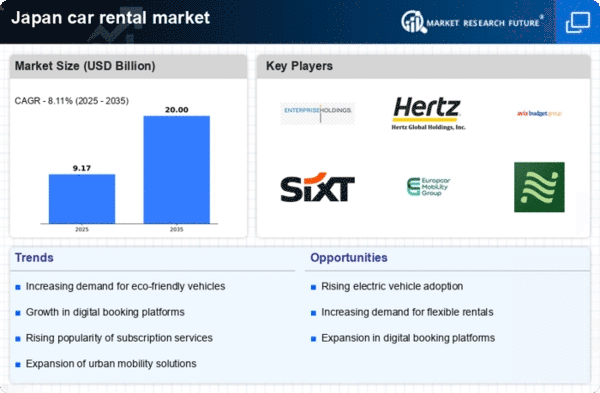Rise of E-commerce and Delivery Services
The surge in e-commerce and delivery services in Japan is influencing the car rental market in unexpected ways. As online shopping continues to grow, there is an increasing need for logistics and transportation solutions. Rental companies are beginning to explore partnerships with e-commerce platforms to provide delivery vehicles, thereby diversifying their service offerings. This trend could lead to a potential revenue increase of 10% for rental firms that successfully integrate delivery services into their business models. Additionally, the flexibility of rental agreements allows businesses to scale their logistics operations without the burden of long-term commitments. This adaptability positions the car rental market favorably in the face of changing consumer behaviors and economic conditions.
Urbanization and Increased Travel Demand
Japan's rapid urbanization is significantly impacting the car rental market. As more individuals migrate to urban centers, the demand for flexible transportation options rises. In metropolitan areas like Tokyo and Osaka, the population density creates a unique environment where public transport may not always suffice. Consequently, the car rental market is poised to benefit from this trend, with an estimated growth rate of 8% annually. Additionally, the rise in domestic tourism, fueled by government initiatives to promote local travel, further contributes to the increased demand for rental vehicles. This urban-centric travel behavior suggests that rental companies must adapt their offerings to cater to the preferences of urban dwellers, thereby enhancing their market presence.
Regulatory Changes and Compliance Requirements
The car rental market in Japan is subject to evolving regulatory frameworks that impact operational practices. Recent changes in transportation laws and environmental regulations necessitate that rental companies adapt their fleets to comply with stricter emissions standards. This shift may require significant investment in newer, eco-friendly vehicles, which could represent an increase in operational costs. However, compliance with these regulations can also serve as a competitive advantage, as consumers increasingly prefer environmentally responsible options. The potential for government incentives for adopting green technologies may offset some of these costs, allowing companies to maintain profitability while enhancing their market position. Thus, navigating these regulatory changes is crucial for sustained growth in the car rental market.
Technological Advancements in Fleet Management
The car rental market in Japan is experiencing a notable transformation due to advancements in fleet management technologies. Innovations such as telematics and real-time tracking systems enhance operational efficiency and customer satisfaction. These technologies allow rental companies to monitor vehicle performance, optimize maintenance schedules, and reduce downtime. As a result, the industry is likely to see a reduction in operational costs by approximately 15%, which could lead to more competitive pricing strategies. Furthermore, the integration of mobile applications for booking and vehicle access is becoming increasingly prevalent, catering to the tech-savvy consumer base in Japan. This shift not only streamlines the rental process but also aligns with the growing demand for convenience among customers, thereby driving growth in the car rental market.
Consumer Preferences for Flexible Mobility Solutions
In Japan, consumer preferences are shifting towards flexible mobility solutions, which is reshaping the car rental market. The traditional model of car ownership is being challenged by a growing desire for convenience and cost-effectiveness. Many consumers, particularly younger generations, are opting for rental services that offer short-term access to vehicles without the responsibilities of ownership. This trend is reflected in the increasing popularity of subscription-based rental models, which provide users with the flexibility to choose vehicles based on their needs. As a result, the car rental market is likely to see a growth trajectory of around 12% as companies adapt to these changing preferences. This shift indicates a broader transformation in how mobility is perceived and utilized in urban environments.
















